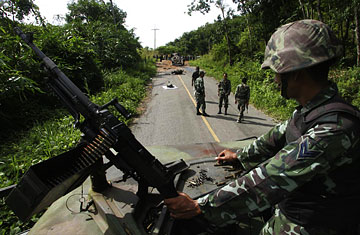
A soldier stands guard on his vehicle after a bomb attack in Yala province, south of Bangkok, on Aug. 22, 2009
The bloodshed persists despite a new campaign by the current Democrat-led government to win the hearts and minds of Thailand's Muslim population through community-led initiatives and development aid. In fact, if the rate of violence in the first eight months of 2009 continues through December, this year will be bloodier than 2008. In June, unidentified gunmen sprayed a mosque with bullets, killing 12 people, while late last month a 50-kg car bomb detonated at a packed restaurant, wounding some 50 bystanders.
Unlike with many other Muslim terror groups, the insurgents in Thailand's deep south don't tend to claim responsibility for their actions, nor have they publicly stated the reasons for their violent handiwork. Nevertheless, there's no doubt that Muslims in largely Buddhist Thailand have faced decades of prejudice, even on an official level. In a particularly tragic incident in 2004, hundreds of Muslim protesters in the village of Tak Bai were rounded up by security forces, stuffed like sardines into trucks and left to roast in the heat during a drive to an army detention center in Pattani. At least 78 people suffocated to death, and seven others died during the demonstration itself. Then Prime Minister Thaksin Shinawatra, whose administration had taken a particularly hard line in the south, claimed that the detainees might have succumbed because it was Ramadan and they were weakened by religious fasting. An inquest this May acknowledged that the victims had died of asphyxiation but did not officially implicate any Thai authorities, a verdict decried by human-rights activists and locals alike.
In contrast to Thaksin's iron-fisted approach, the current government led by Prime Minister Abhisit Vejjajiva has adopted a far more conciliatory attitude toward Thai Muslims. He has unveiled a $1 billion-plus economic stimulus plan for Thailand's deep south in an effort to counter deep-seated Muslim antipathy toward the central government. But despite the rubber-plantation and road projects, these three southernmost provinces have also turned into a giant militarized zone over the past couple years. Some 60,000 Thai military and police forces patrol the region, a troop surge that has frightened many locals who complain of arbitrary detentions and other abuses.
A recent poll of southern Thais by the respected Prince of Songkla University found that among various groups [EM] public health workers, religious figures, teachers, village headmen and so on [EM] the least-trusted individuals were those from the military and the police. In fact, only 18.6% of locals in the deep south fully agreed that a military solution was the right one for these three troubled provinces. An Amnesty International report released earlier this year condemned Thai security forces for using torture against detainees, not least because such violations would only stoke further radicalization among already disenchanted Muslim youth. Given the steady number of deaths that continue to convulse the region, the government's campaign to win hearts and minds hasn't paid off yet. All the more disheartening information to keep out of those sunny tourist brochures.
